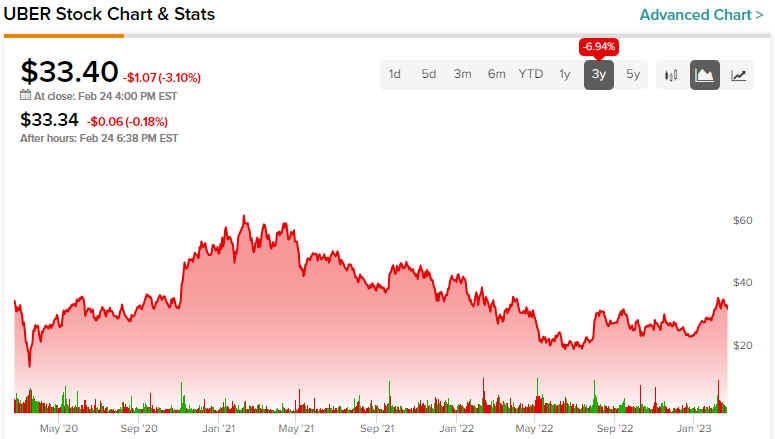Ridesharing and delivery behemoth Uber Technologies (NYSE:UBER) stock took the investing community by surprise two weeks ago, reporting outstanding Q4 results and providing guidance above expectations. Uber rides are getting faster (implying lower wait times), and the stock is up 31.7% year-to-date. Further, Mobility Gross Bookings and the adjusted EBITDA margin reached all-time highs on a quarterly basis during Q4.
Stay Ahead of the Market:
- Discover outperforming stocks and invest smarter with Top Smart Score Stocks
- Filter, analyze, and streamline your search for investment opportunities using Tipranks' Stock Screener
Looking at the resilient results and growing profitability despite a tough macro scenario, I believe the stock still has a significant runway for growth in the coming years based on its solid fundamentals. Therefore, I will buy UBER at its current price.
Most investors will think it’s too late to buy the stock at its current levels. However, looking at the long-term chart, it’s still far below its 2021 high of ~$64.

Q4 Exhibits Growing Profitability
On February 8, Uber reported its Q4 results. Earnings per share of $0.29 handily beat the street’s expectations by a whopping $0.44 per share. Impressively, sales grew 48.8% year-over-year to $8.6 billion, driven by overall gross bookings growth of 19%. On the contrary, competitor Lyft (NASDAQ:LYFT) reported dismal Q4 results that took the stock down over 36% on February 10.
The biggest highlight of Uber’s quarter was the fast-paced growth in EBITDA profitability reported during the quarter. It is worth noting that in the past six quarters, Uber has exceeded its incremental EBITDA margin target. In Q4, Uber posted an adjusted incremental EBITDA margin of 11.9% (12.3% for Rides and 25% for Eats).
Resilient bookings in the Mobility and Delivery segments also put investor fears of weakening consumer spending to rest, at least for Uber stock. During Q4, bookings in the Mobility segment increased 31% year-over-year to $14.9 billion, exceeding its Delivery segment bookings for the first time since the COVID-19 pandemic.
Not only did Uber report exceptional results, but it also gave out an impressive Q1 outlook, benefiting from higher efficiency and enhanced unit economics. For Q1, gross bookings are expected to be in the range of $31 – $32 billion, while adjusted EBITDA is projected to range between $660 million and $700 million.
The company reached yet another milestone, “crossing 2 billion trips in a single quarter for the first time—an average of nearly 1 million trips per hour,” as stated by CEO Dara Khosrowshahi. In addition, its subscription service, Uber One, also saw accelerating growth during the quarter.
Strong Competitive Advantage Across All Business Verticals
Uber’s moat continues to become stronger, driven by its unique platform-specific advantages. Its multi-product platform offering ensures higher utilization and earnings for potential drivers. Meanwhile, recessionary fears have led to a higher supply of drivers.
During Q4, drivers on Uber’s platform increased 35% year-over-year, with drivers’ earnings up 37%. A robust supply of drivers ensured lower wait times (4.5 mins in the U.S. in January) and prices for customers. These are the two most important variables for customer stickiness.
Unlike most COVID-19 beneficiaries seeing a reversal of demand and revenues, Uber is getting closer to its 2024 profitability and free cash flow goals. At its investor day held in February 2022, management guided for long-term adjusted EBITDA of $5 billion (versus -$0.8 bn in 2021) and free cash flows of $3.5 billion – $4 billion in 2024. Additionally, gross bookings were projected to reach $165 billion – $175 billion in 2024.
Mobility trip growth is accelerating, and Delivery growth also showed strength during Q4. Further, cross-selling between Mobility and Delivery is leading to higher revenues and lower customer acquisition costs.
Management stated, “Remember, we get more new eaters from our Rides app than we do from Google and Facebook and Instagram combined, at about a quarter of the cost. So that is a very significant structural advantage that is assisting our Delivery business…We do think that we should continue to outgrow the category in Delivery, going forward, based on the environment that we’re seeing.”
Further, its Advertising business continues to grow to register a $500 million annual run rate. Management’s target is to reach $1 billion by 2024. Notably, the segment saw an 80% surge in active advertisers during Q4.
Is Uber Stock a Buy, According to Analysts?
The Wall Street community is clearly optimistic about the stock. Overall, Uber commands a Strong Buy consensus rating based on 24 Buys and one Hold. UBER stock’s average price forecast of $47.83 implies a 43.2% upside potential from current levels.

In terms of its valuation, UBER is trading at an EV/sales ratio of 2.4x, higher than the peer group average of 1.8x. Nonetheless, the premium is justified given its favorable industry-leading position and larger total addressable market or TAM. Yet, it’s trading at much lower levels compared to the high of 11x for its EV/sales ratio seen in the past two years.
Conclusion: Uber Stock Remains Attractive
Yet another solid quarterly beat reported by Uber speaks volumes about the business strength and resilience of its growth prospects that remain untouched by the macroeconomic slowdown.
Uber continues to enjoy a market-leading position in the global mobility and food delivery space. Both businesses have humungous growth potential. It has posted record revenues, higher margins, and market share gains and will continue to do so for many years to come.
The stock has risen 17% since I last wrote about it in November. Nonetheless, the long-term growth thesis remains intact. Given solid demand trends and a positive long-term growth outlook across Uber’s businesses, I will surely hail the Uber ride yet again.









